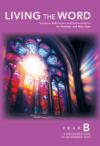Tastes of Beauty in the Body of Christ
The Most Holy Body and Blood of Christ
Deuteronomy 8:2–3, 14b–16a / Psalm 147:12 / 1 Corinthians 10:16–17 / John 6:51–58
<< Back to LECTIONARY RESOURCES
Reflecting on the Word
By Dr. Karla J. Bellinger
She was young. But she remembers that dry day like it was yesterday. “This is ridiculous. How can he give us his flesh to eat?” She listens to the shouting. She sits outside the synagogue. As a woman, she’s not permitted to enter. But she can hear them clearly. This is Jesus of Nazareth they are yelling at; Jesus, whose love has transformed her; Jesus, whose words burn like a fire inside of her. Can they not see what he is offering? “Bread of Life—who does he think he is? We know his father from Nazareth. He’s a carpenter’s son.” The door opens and the leaders stomp their feet into the dust of the dry ground and walk away.
She wants to shout after them in the distance, “You never really heard him,” but again she hears voices at the doorway, not so loud, but irritated: “This saying is hard; who can accept it? The Bread of Life! How can he say he is the Bread of Life?” Those who had walked closely with him began to walk away also. She knew these ones. She had eaten with them. They were his own. “We will no longer go with him . . . I am going home.” She is grief-stricken. She shouts, “How can you leave him? His words are Spirit and life!” “Ah, woman, you are young. Go home also.”
The door opens a third time and he comes out, full of sorrow. “Will you also leave me?” Peter says the words she will remember all her life. She has told them to her children and her children’s children. Now as her community is struggling with betrayal and desertion, she shares what Peter said: “Master, to whom shall we go? You have the words of eternal life.”
Rain began to fall on the dry soil, watering the earth.
Consider/Discuss
- Is this teaching of Jesus too hard? Doubt tastes like dust in the mouth. Faith refreshes like the rain. As many walk away, how can we express what Jesus in the Eucharist means to us? How can we describe the taste of glory that comes as we open our hands to receive him?
- We believe that the Eucharist is the sacrament of unity in the Church. Yet like this unnamed young woman of the first century, some sit at the peripheries, some voices are not heard, some are rendered invisible. How can we be more conscientious in our sharing, our koinonia, in bringing in those at the edges, to solidify the Body of Christ?
Living and Praying with the Word
Lord, you are the Bread of Life. We have tasted your manna. We have been touched by your presence. You unite us so that together we can abide in you. At the same time, we grieve for those who walk away. We love them. How can they go? Even the angels weep.
Holy Spirit, bubble up within us so that we bring your life to the world in which we live.
